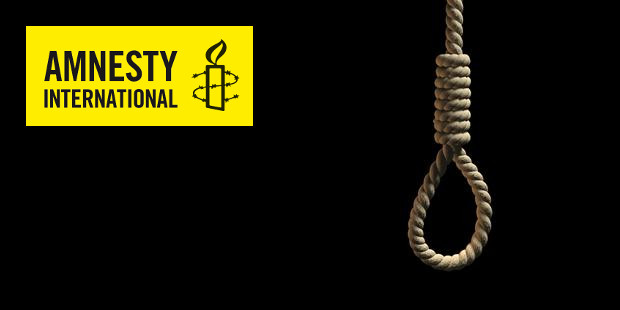Iran: Lives of two death row inmates from Kurdish minority at risk amid surge in executions
Two death row prisoners from Iran’s Kurdish minority are at imminent risk of being executed after the Iranian authorities carried out 20 death sentences over the weekend, Amnesty International warned today.
“This surge in executions shows that behind words and promises, the Iranian authorities continue to rely on state-sponsored killing, sparking fears that Zaniar Moradi and Loghman Moradi, two Kurdish minority prisoners on death row, could be next,” said Hassiba Hadj Sahraoui, Middle East and North Africa Deputy Director at Amnesty International.
“These and all other executions must be halted immediately. While the Iranian authorities have a responsibility to bring those suspected of criminal offences to justice, the death penalty should never be used, as it is the ultimate cruel, inhuman and degrading punishment.”
Iranian prisoners are routinely sentenced to death after unfair trials, and despite allegations of torture being used to extract “confessions” in pre-trial detention.
Zaniar Moradi and Loghman Moradi, both death row prisoners from Iran’s Kurdish minority, claim they were tortured into “confessing” to the 2009 murder of the son of a senior cleric in Marivan, Kurdistan province. They were sentenced to death in December 2010 after being convicted of “enmity against God” (moharebeh) and “corruption on earth” for the murder. They were also convicted of participating in armed activities with Komala, a Kurdish opposition group, which conducted armed struggle against the Islamic Republic of Iran.
“Even the most basic requirements of Iranian law seem to have been flouted and it seems that the prisoners and their families were not notified and families only learned of their executions when they went to visit their loved ones,” said Hassiba Hadj Sahraoui.
Habibollah Golparipour executed
Among those executed over the weekend was Habibollah Golparipour, another Kurdish minority political prisoner for whom Amnesty International has campaigned.
On the morning of 25 October, he was transferred from solitary confinement in Oroumieh Prison, West Azerbaijan Province, north-west of Iran, to an unknown location and executed the same evening. His family was not notified beforehand After his execution, the Iranian authorities have reportedly refused to hand over his body to his family adding to their distress.
Habibollah Golparipour was sentenced to death in a five-minute trial in March 2010. He had been arrested in September of the previous year in north-western Iran and convicted of “enmity against God” (moharebeh) through his alleged cooperation with a banned armed group, the ‘Party For Free Life of Kurdistan’ (PJAK). According to the court documents, he had denied any armed activity. He subsequently wrote a letter to Iran’s Supreme Leader, alleging he was tortured during interrogation – but these allegations were never investigated.
‘Retaliation’ killings
On 26 October, Ebrahim Hamidi, Justice Chief of Iran’s Sistan-Baluchestan province, announced that 16 individuals had been executed that morning in “retaliation” for a border attack a day earlier. The Sunni armed group, Jaish-ul-Adl (Army of Justice), had reportedly killed 14 border guards in the city of Saravan in the same province, near the border with Pakistan.
According to the Public Prosecutor, Mohammad Marzieh, the executed men had been sentenced to death several years earlier. The provincial Justice Chief said that eight of those executed had been convicted of “enmity against God” (moharebeh) and “corruption on earth” (ifsad fil-arz) for their alleged membership in an armed militant group in Sistan-Baluchestan Province. The other eight individuals had been convicted of drugs offences.
“Executing prisoners for an attack they clearly were not involved in and boasting that it is in ‘retaliation’ for that attack puts into question the very principles of criminal law, the foremost of which being that nobody should be punished for a crime one has not committed,” said Hassiba Hadj Sahraoui.
A sharp rise in executions
A drop in the number of executions in Iran in 2012, compared to the previous year, sparked hope that the Iranian authorities were making an effort not to resort so often to the death penalty. But 2013 has again seen a sharp rise in the number of executions in Iran.
The Iranian authorities have officially acknowledged 304 executions so far in 2013 but reliable sources have reported at least 234 additional unacknowledged executions during the year.
“Iran’s new government has been cautiously lauded on the world stage for limited signs of progress, including releasing some prisoners of conscience. But the renewed dependence on the death penalty gives a startling example of one area where the Iranian authorities are clearly stubborn,” said Hassiba Hadj Sahraoui.
In his 4 October 2013 report, Ahmed Shaheed, the Special Rapporteur on Iran, called on the Iranian authorities to declare a moratorium on all executions; ban public executions, including stoning; and limit capital punishment to offences considered to be serious crimes under international law. In their reply to the Special Rapporteur’s draft report, the Iranian authorities defended their execution record by stating that the death penalty is a recognized punishment in international instruments for the most serious crimes.
Amnesty International opposes the death penalty in all circumstances.
report link:
http://www.amnesty.org/en/news/iran-lives-two-kurdish-death-row-inmates-risk-amid-surge-executions-2013-10-28
